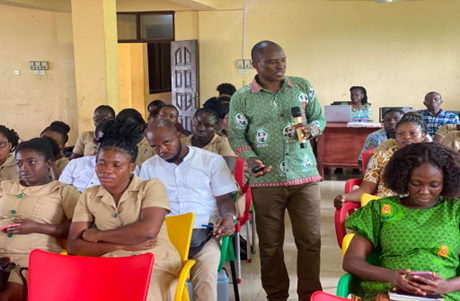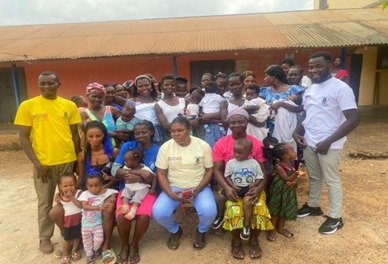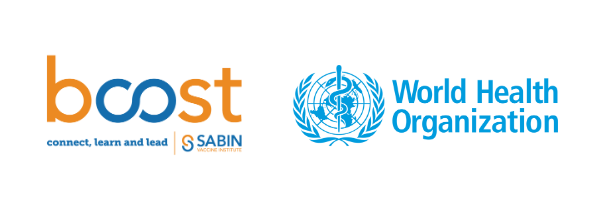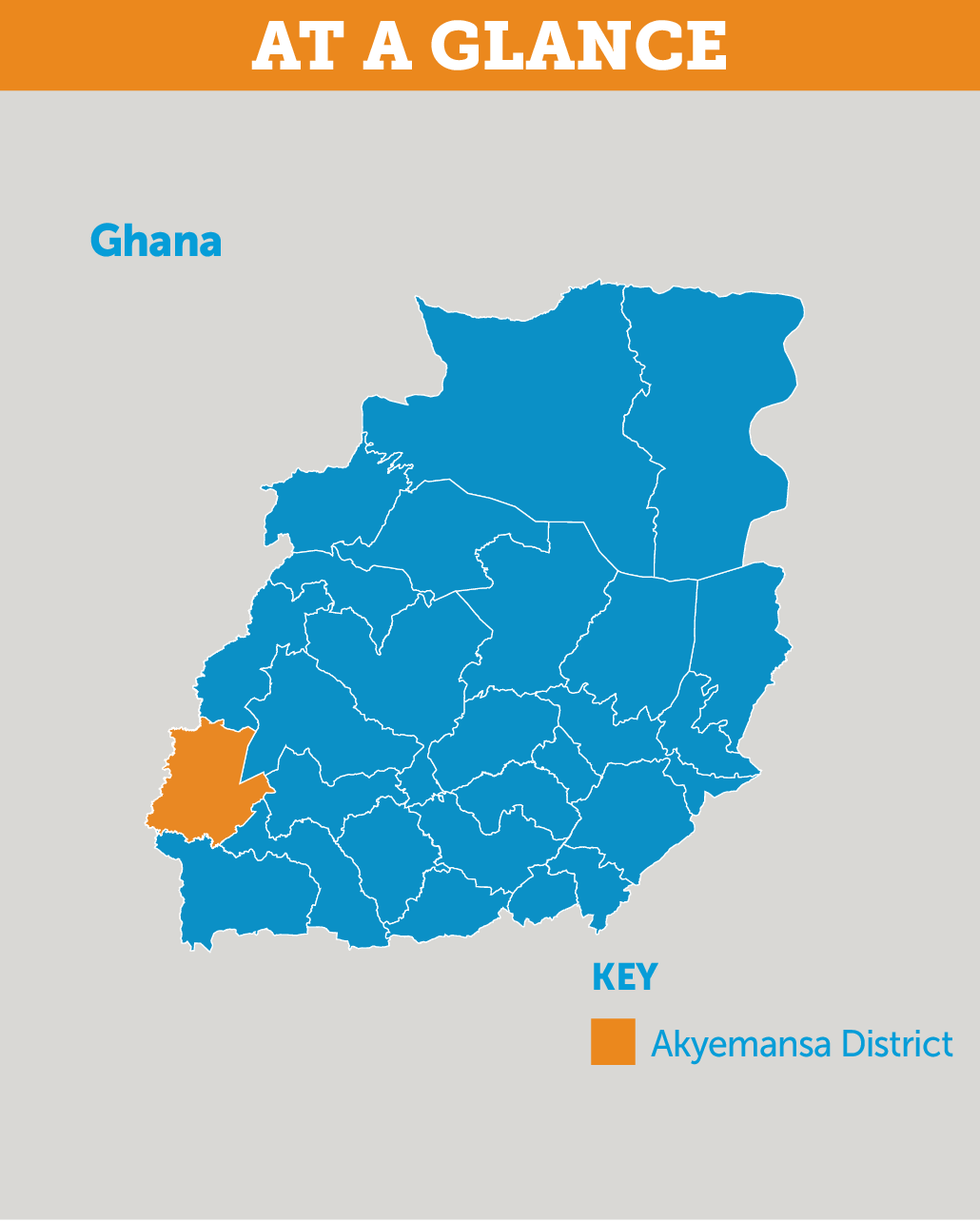Community as Stakeholders to Restore Routine Immunization in Ghana
In May 2022, Sabin’s Boost Community and the World Health Organization (WHO) launched the first cohort of the "COVID-19 Recovery for Routine Immunization Programs Fellowship". The aim of this program was to strengthen the capacity of national and sub-national immunization professionals to plan and implement immunization programming during the COVID-19 recovery period, with the ultimate goal of reversing the declining rates of immunization coverage. After an intensive live engagement series, Fellows were tasked with drafting their own strategic proposal for implementation or case study for publication. This series of Bright Spots share Fellows' key learnings and takeaways from the program.
The World Health Organization (WHO) has reported that the COVID-19 pandemic’s disruption of routine immunization resulted in an increase in the number of unvaccinated children by 3.4 million, globally. In Akyemansa District – one of the 33 municipalities and districts of the Eastern region of Ghana – immunization rates were at a record low even before the pandemic struck. This situation became dire with the onset of the COVID-19 pandemic.
Post-pandemic, other regions of Ghana slowly began to climb back to their earlier immunization rates and some even witnessed an increase in the uptake of vaccines. In Akyemansa, however, over 50% of children had still not received the second dose of the measles-rubella vaccine and over 40% did not receive the 3rd dose of the Pentavalent vaccine (Ghana Health Service, Akyemansa District Health Administration, 2021).
The Post-Pandemic Situation in Akyemansa
Measles-rubella Vaccine
50% did not receive the second dose
Prevalent Vaccine
40% did not receive the third dose
As a Senior Technical Ocer in charge of Disease Control at the Akyemansa District Health Administration, Clement Avoka registered this situation in his jurisdiction with great concern. On further inquiry from mothers during his routine visits to communities, Clement gathered that most mothers could not recall their children’s vaccination schedules. In Akyemansa, cases of teenage pregnancies are high. As a result, most mothers have only basic formal education, which means tracking immunization information can be challenging. Additionally, some parents yielded to the disinformation and misinformation that surrounded COVID-19 vaccination, fueling hesitancy towards other vaccines.
“A lot of women were not coming because some of them said if you go for the session, they will vaccinate you by force,” – Clement said.
This immunization information gap was further exacerbated by the fact that the district is vast and lacks essential health infrastructure and amenities, including a district hospital. As a result, residents would have to travel to neighboring districts to receive healthcare services. Akyemansa lies in the hard to access Eastern Region, and with limited resources, it’s challenging for nurses to provide services adequately across the district, meaning healthcare often does not reach people. The only way Clement could counter immunization gaps in Akyemansa was by driving demand for vaccines, which could only happen through community involvement. The COVID-19 Recovery for Routine Immunization Programs Fellowship by the Sabin Vaccine Institute’s Boost Community and the World Health Organization (WHO) came in at this integral stage of Clement’s strategy formulation and accelerated Clement’s immunization recovery strategies in Akyemansa to full-blown implementation.

The first step entailed training 113 women accompanists and 105 preschool teachers as a representative group that would be responsible for providing reminders on immunization days and educating the entire community on immunization. Additionally, 27 health workers identified from three poor-performing sub-districts of Akyemansa were trained extensively on immunization, accelerating the goal of communicating vaccination information effectively.
Despite creating immunization awareness in the community, another gap existed. More support to caregivers was needed. As a result, Clement devised a Caregiver–Accompanist strategy where a group of mothers from the community volunteered to work with nurses as accompanists to ensure that caregivers in the community did not forget immunization appointments. These accompanists were trained and facilitated, and they would meet with the nurses who would inform them of impending immunization dates. They would then reach out to caregivers in their homes and deliver information from the nurses to them.
Additionally, there was a need to cater to school-going children who were five years old and under. For this, Clement partnered with the Ghana Education Service (GES) to convert schools into vaccination centers in order to promote the uptake of the second year of life (2YL) vaccine. In this case, teachers kept printed copies of the children’s health record books (CHRB) for school vaccination sessions.
Further, 27 nurses learned how to carry out school vaccinations. Eight senior GES teachers were trained as circuit supervisors who would ensure eective vaccination took place in schools, with collaboration from other teachers.
TRAININGS
27 health workers trained
113 women accompanists trained
105 preschool teachers trained
Having laid the groundwork for routine immunization in the community, health facilities, and schools, the next step was to monitor and evaluate the efficacy of the strategies put in place. Monthly meetings were conducted to appraise immunization data shared by facilities. This aided in data proofing for errors as well as heightened capacity strengthening for nurses on data-based reporting.
Accompanists also shared their feedback to the project steering team who leaned on this information to chart ways to address emerging challenges.

While there were vaccine shortages in Akyemansa in the first quarter of 2023, routine immunization stands unshaken on the firm foundation of the community-led demand. Nurses still hold monthly meetings with accompanists which in turn has strengthened the caregiver-accompanist relationship as home visits are a regular undertaking that is now expected by the community. School vaccination on the other hand has seen a majestic leap as all pre-schools are included in the immunization schedule and visited by nurses monthly.
Upward Trend in Immunization
By 2022 attendance at vaccination centers increased by 20%
Coverage increased by 2% (Penta3), 1% (BCG), 7% (MR2) from October to December 2022 (as compared to the same period in 2021)
Clement is optimistic about the upward trajectories of routine immunization in Akyemansa in 2023 and the coming years. His immunization recovery project transformed how Akyemansa residents view immunization and healthcare in general; it empowered every member of the community to be a stakeholder steering the process.

2022 Fellow & Contributor
Clement Avoka is a Senior Technical Officer working with the Ghana Health Service. He has over 13 years of experience working in immunization, especially in hard-to-reach areas. In the wake of COVID-19 Clement was keenly aware of the importance of routine immunization in protecting vulnerable populations, especially children, and was driven by a strong commitment to ensure equitable access to vaccines and enhance immunization coverage in the Akyemansa District. He looks back at the opportunity to work alongside renowned experts in the field and collaborate with global partners through the Fellowship as a boon for him and those in the region. He is currently undertaking a second MSc Degree in Public Health at the Carolina University in the United States of America.


